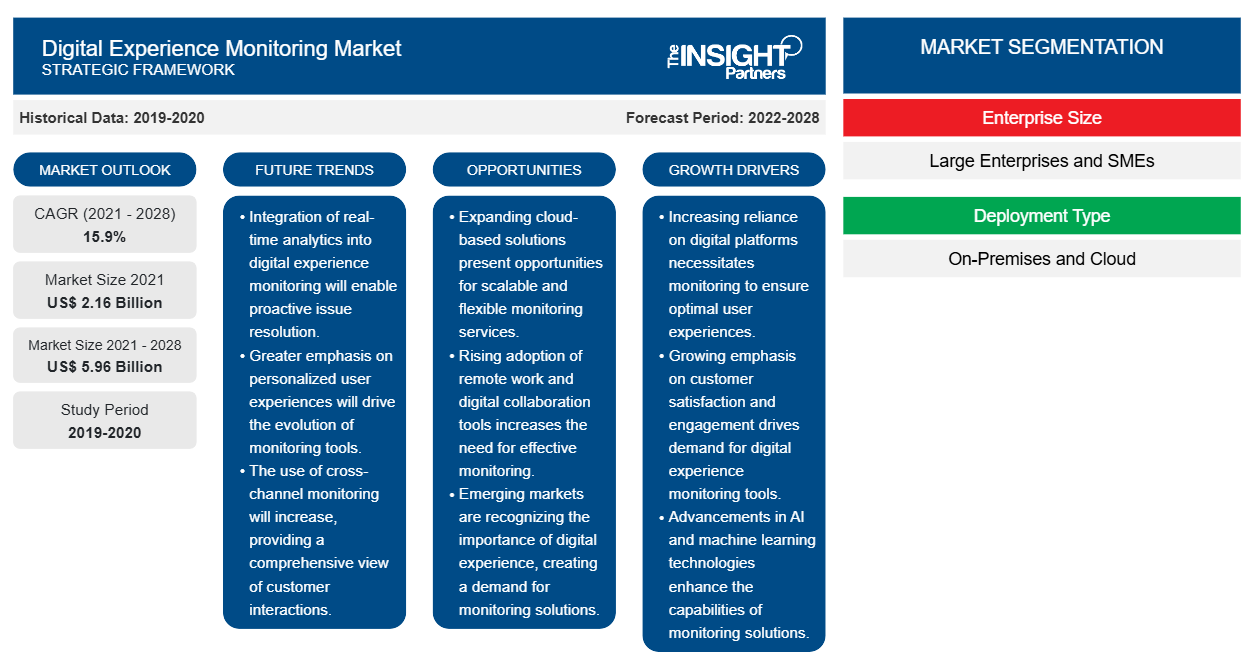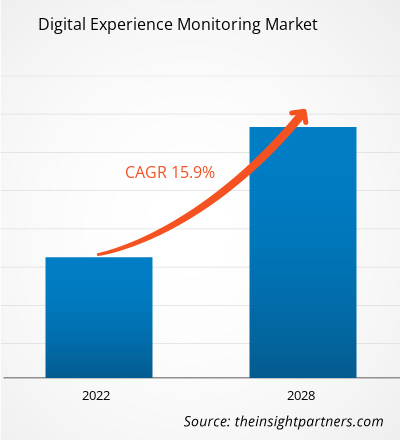Digital Experience Monitoring Market Growth and Recent Trends by 2028
Digital Experience Monitoring Market Forecast to 2028 - COVID-19 Impact and Global Analysis By Enterprise Size (Large Enterprises and SMEs), Deployment Type (On-Premises and Cloud), and End-User (BFSI, IT and Telecommunications, Retail and Consumer Goods, Healthcare and Life Sciences, and Others)
Historic Data: 2019-2020 | Base Year: 2021 | Forecast Period: 2022-2028- Report Date : May 2022
- Report Code : TIPRE00023414
- Category : Technology, Media and Telecommunications
- Status : Published
- Available Report Formats :


- No. of Pages : 180
The digital experience monitoring market size is expected to grow from US$ 2,156.71 million in 2021 to US$ 5,960.87 million by 2028. Digital experience monitoring market size is estimated to grow at a CAGR of 15.9% from 2022 to 2028.
Digital experience monitoring (DEM) is a new technology that enterprises are looking at as a method to simplify user performance concerns while gaining insight into a range of networking technologies with a single solution. The progression of application performance monitoring (APM) and end-user experience monitoring (EUEM) into a holistic solution that assesses the efficacy of an enterprise's applications and services is DEM. DEM is a real-time monitoring solution that assists IT operations teams in promptly resolving user concerns while ensuring the network is not disturbed. Existing application performance monitoring (APM) and network performance monitoring and diagnostics (NPMD) technologies can be supplemented with DEM solutions. When used together, they give an end-to-end view, with DEM providing insight into the user experience. Those are the experiences that have the most direct impact on company outcomes. DEM is a real-time monitoring tool that helps your company's "machine" function smoothly by discovering vulnerabilities that cause downtime or disturbances to the user experience, such as poor page load times, and determining the underlying cause of performance. The DEM software monitors user behavior, traffic, and additional factors to help businesses understand product usability and performance. DEM products integrate active or simulated traffic and real-user monitoring to analyze theoretical performance and real-user experience. These tools provide analytical tools for examining and improving application and site performance. They also help businesses understand how visitors navigate through their site and discover where end-user experience appears to suffer.
Examining performance data across devices, apps, infrastructure, and services to understand how end users' interactions with technology influence the quality of their digital experience is known as DEM. IT may track and assess various parameters that affect users, including CPU, memory, hardware utilization, latency, software performance, and more, using digital experience monitoring. These measurements, which are collected constantly from the endpoint and paired with cognitive analysis and automation, may assist IT in promptly diagnosing, remediating, and even predicting problems without the user's knowledge. Feedback and opinion can also indicate elements, which endpoint statistics can't capture. Digital experience monitoring solutions go beyond typical network and application performance monitoring to uncover network issues, which may affect cloud-based service performance. This factor is influencing the digital experience monitoring market growth.
Customizee This Report To Suit Your Requirement
Get FREE CUSTOMIZATIONDigital Experience Monitoring Market: Strategic Insights

-
Get Top Key Market Trends of this report.This FREE sample will include data analysis, ranging from market trends to estimates and forecasts.
Impact of COVID-19 Pandemic on Digital Experience Monitoring Market
With the emergence of the COVID-19 pandemic, the entire aviation industry came to an unscheduled halt. Turkey, Iran, South Africa, Iraq, Israel, Saudi Arabia, and the UAE reported a large number of COVID-19 confirmed cases and deaths. The digital experience monitoring market comprises major economies, such as the UAE and Saudi Arabia, which are prospective providers in the digital experience monitoring industry due to the huge presence of a diverse customer base. Before the pandemic, Gulf countries were on the verge of adopting transformative digital technologies in various verticals to improve the socio-economic conditions of the countries. However, due to the COVID-19 outbreak, the implementation of stringent measures such as factory lockdowns, business shutdowns, and travel restrictions aggravated the economic problems of the countries, such as the MEA. Hence, the MEA’s economic condition and the impact of the COVID-19 pandemic on the growth of various industries in the region slightly influenced the digital experience monitoring market growth in 2020.
Digital Experience Monitoring Market Insights
The customer feedback system critical to any functional and profitable digital experience monitoring industry has been enhanced thanks to technology improvements in the digital experience monitoring market. For example, companies are implementing an online feedback system using a cutting-edge Customer Relationship Management (CRM). As a result, client input directly aids in making real-time modifications and updating the company’s software to conduct a real-time assessment of the quality and adjust or change as needed. Any company experiencing a digital transition must implement experience monitoring systems. Streamlining the digital procedures involved in running a company lays a strong basis for future system changes or ongoing innovation. This is driving the digital experience monitoring market.
Enterprise Size-Based Market Insights
Digital experience monitoring market analysis by enterprise size, the market is segmented into large enterprises and SMEs. In 2021, the large enterprises segment accounted for a larger digital experience monitoring market share.
Deployment Type-Based Market Insights
Digital experience monitoring market analysis by deployment type, the market is segmented into on-premises and cloud. In 2021, the cloud segment accounted for a larger digital experience monitoring market share.
Players adopt strategies, such as mergers, acquisitions, and market initiatives, to maintain their positions in the market. A few developments by key players in the market are listed below:
- In 2022, BMC announced new capabilities and integrations across its BMC AMI (automated mainframe intelligence) and BMC Compuware portfolios. The innovations help customers improve service quality and accelerate software delivery by providing greater data visibility and context-based insights across their IT environments.
- In 2021, Broadcom Inc. acquired AppNeta to bolster network performance monitoring across the internet and hybrid cloud-based applications. By combining AppNeta's end-to-end visibility with Broadcom's award-winning and proven Infrastructure and AIOps capabilities, the world's largest enterprises running the most complex networks will now have access to a single source of truth to support their cloud journey.
The regional trends and factors influencing the Digital Experience Monitoring Market throughout the forecast period have been thoroughly explained by the analysts at The Insight Partners. This section also discusses Digital Experience Monitoring Market segments and geography across North America, Europe, Asia Pacific, Middle East and Africa, and South and Central America.
Digital Experience Monitoring Market Report Scope
| Report Attribute | Details |
|---|---|
| Market size in 2021 | US$ 2.16 Billion |
| Market Size by 2028 | US$ 5.96 Billion |
| Global CAGR (2021 - 2028) | 15.9% |
| Historical Data | 2019-2020 |
| Forecast period | 2022-2028 |
| Segments Covered |
By Enterprise Size
|
| Regions and Countries Covered |
North America
|
| Market leaders and key company profiles |
|
Digital Experience Monitoring Market Players Density: Understanding Its Impact on Business Dynamics
The Digital Experience Monitoring Market is growing rapidly, driven by increasing end-user demand due to factors such as evolving consumer preferences, technological advancements, and greater awareness of the product's benefits. As demand rises, businesses are expanding their offerings, innovating to meet consumer needs, and capitalizing on emerging trends, which further fuels market growth.

- Get the Digital Experience Monitoring Market top key players overview
Company Profiles in the Digital Experience Monitoring Market Report
- BMC Software, Inc.
- Broadcom Inc.
- ControlUp Technologies LTD
- Lakeside Software, LLC
- Aternity LLC
- Nexthink SA
- AppDynamics LLC
- Catchpoint Systems, inc.
- Dynatrace LLC
- IBM Corporation
- Micro Focus
- Oracle Corporation
- Riverbed Technology, Inc.
- SAP SE
Frequently Asked Questions
Ankita is a dynamic market research and consulting professional with over 8 years of experience across the technology, media, ICT, and electronics & semiconductor sectors. She has successfully led and delivered 100+ consulting and research assignments for global clients such as Microsoft, Oracle, NEC Corporation, SAP, KPMG, and Expeditors International. Her core competencies include market assessment, data analysis, forecasting, strategy formulation, competitive intelligence, and report writing.
Ankita is adept at handling complete project cycles—from pre-sales proposal design and client discussions to post-sales delivery of actionable insights. She is skilled in managing cross-functional teams, structuring complex research modules, and aligning solutions with client-specific business goals. Her excellent communication, leadership, and presentation abilities have enabled her to consistently deliver value-driven outcomes in fast-paced and evolving market environments.
- Historical Analysis (2 Years), Base Year, Forecast (7 Years) with CAGR
- PEST and SWOT Analysis
- Market Size Value / Volume - Global, Regional, Country
- Industry and Competitive Landscape
- Excel Dataset
Recent Reports
Related Reports
Testimonials
The Insight Partners' SCADA System Market report is comprehensive, with valuable insights on current trends and future forecasts. The team was highly professional, responsive, and supportive throughout. We are very satisfied and highly recommend their services.
RAN KEDEM Partner, Reali Technologies LTDsI requested a report on a very specific software market and the team produced the report in a few days. The information was very relevant and well presented. I then requested some changes and additions to the report. The team was again very responsive and I got the final report in less than a week.
JEAN-HERVE JENN Chairman, Future AnalyticaWe worked with The Insight Partners for an important market study and forecast. They gave us clear insights into opportunities and risks, which helped shape our plans. Their research was easy to use and based on solid data. It helped us make smart, confident decisions. We highly recommend them.
PIYUSH NAGPAL Sr. Vice President, High Beam GlobalThe Insight Partners delivered insightful, well-structured market research with strong domain expertise. Their team was professional and responsive throughout. The user-friendly website made accessing industry reports seamless. We highly recommend them for reliable, high-quality research services
YUKIHIKO ADACHI CEO, Deep Blue, LLC.This is the first time I have purchased a market report from The Insight Partners.While I was unsure at first, I visited their web site and felt more comfortable to take the risk and purchase a market report.I am completely satisfied with the quality of the report and customer service. I had several questions and comments with the initial report, but after a couple of dialogs over email with their analyst I believe I have a report that I can use as input to our strategic planning process.Thank you so much for taking the extra time and making this a positive experience.I will definitely recommend your service to others and you will be my first call when we need further market data.
JOHN SUZUKI President and Chief Executive Officer, Board Director, BK TechnologiesI wish to appreciate your support and the professionalism you displayed in the course of attending to my request for information regarding to infectious disease IVD market in Nigeria. I appreciate your patience, your guidance, and the fact that you were willing to offer a discount, which eventually made it possible for us to close a deal. I look forward to engaging The Insight Partners in the future, all thanks to the impression you have created in me as a result of this first encounter.
DR CHIJIOKE ONYIA MANAGING DIRECTOR, PineCrest Healthcare Ltd.Reason to Buy
- Informed Decision-Making
- Understanding Market Dynamics
- Competitive Analysis
- Identifying Emerging Markets
- Customer Insights
- Market Forecasts
- Risk Mitigation
- Boosting Operational Efficiency
- Strategic Planning
- Investment Justification
- Tracking Industry Innovations
- Aligning with Regulatory Trends




















 Get Free Sample For
Get Free Sample For